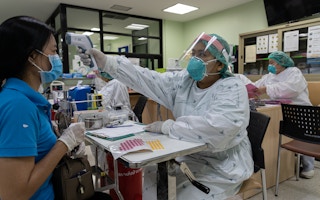The Covid-19 pandemic will have dangerous, far-reaching implications long into the future, especially if it derails recent improvements in many countries’ historically weak health systems.
To avoid that outcome, we urgently need to move beyond merely “protecting the needy” in times of crisis. Episodic donations are not enough. Now is the time to start removing the structural and systemic barriers that have long stood in the way of sustained improvements in global health.
Following global emergencies, the international community tends to revert to “business as usual,” rather than preparing for future disasters. With policymakers focusing solely on fighting fires, instead of addressing their underlying causes, there never seems to be a good time for prevention and mitigation.
And yet, the pandemic has demonstrated that an efficient and effective public-health response requires more than a well-functioning health-care system. It also calls for more robust “systems for health,” which comprise all the sectors that influence public health, including manufacturing, food, transportation, and urban development.
While most of those working in these sectors would not readily identify as “health professionals,” they nonetheless play a pivotal role in producing good health outcomes.
“
With policymakers focusing solely on fighting fires, instead of addressing their underlying causes, there never seems to be a good time for prevention and mitigation.
The gross underfunding of health-care systems in developed and developing countries alike has created critical deficiencies that are now being exposed by the pandemic. The lack of health insurance for millions of the most vulnerable Americans posed a threat to public health long before Covid-19 arrived.
Similarly, under-investment in public-health systems across Sub-Saharan Africa, South Asia, and other regions all but ensured that millions of people would be vulnerable in the event of a crisis.
The pandemic has underscored the need for all societies to provide universal access to high-quality health care without the sick risking financial ruin. It shows that we can no longer turn a blind eye to the longstanding class barriers that allow only the rich to receive the best care on demand.
The pandemic also offers an opportunity to rethink how we pursue innovation and reform within failing systems.
This requires that the global economic system broadens the narrow definitions of innovation to embrace (the often invisible) knowledge generated from across the global South, learning from strategies implemented in Singapore, South Korea, China, Israel, and South Africa to contain the virus and mobilise population-wide testing and contact-tracing strategies.
By integrating expertise from countries that have dealt with previous deadly outbreaks of Ebola, SARS, MERS, and Lassa fever, we can develop more innovative strategies globally. Indeed, had these strategies been in place before Covid-19 spread worldwide, an effective global response to the pandemic would not have proved elusive.
As the pandemic expands into countries where traditional practices are core to the notion of wellness, it will be critical to integrate these diverse knowledge systems into health-education strategies for disease prevention and treatment.
Moreover, given the dramatic reduction in trade and economic activity, there is good reason to expect that many retail jobs will be lost permanently, and that the number of delivery jobs will increase. The broad economic disruption that is already underway will leave tens of millions of people in a desperate state, further complicating the effort to control the spread of the virus.
Here, the impact-investing community has a unique opportunity and a crucial role to play. Ethical, socially beneficial investment can be elevated as an asset class of choice, and impact investors can lead the way in broadening the search for innovators, leveling the geography of knowledge, and thereby facilitating a more effective response to the current crisis.
Because their primary focus is on maximising risk-adjusted returns, traditional investors are unlikely to deploy finance in the areas that need it most right now. But impact investment can, by marshalling the funds needed to bring more diverse innovators into the health and health-adjacent sectors.
More broadly, the pandemic should motivate those outside the impact-investing community to reconsider how financial capital is mobilised and deployed. It is in everyone’s interest to encourage progress toward universal access to high-quality health care globally, because, ultimately, health supports every aspect of society, including the economy.
Beyond addressing the immediate health emergency, Covid-19 also requires that we focus on long-term solutions. There must not be another return to business as usual.
We need to start building robust, inclusive systems that account for all the social determinants of communicable and chronic diseases, which will continue to plague the poorest and most marginalised communities around the world.
Rather than taking comfort in the idea that they are “protecting Africa” or “protecting the poor,” development finance institutions, impact investors, and bilateral funders must set their sights higher.
The goal is not to show that you are a well-meaning do-gooder, but rather to bring about meaningful change through building systems for health.
A good place to start is global public health. As we bury and mourn our dead, we should commit not just words but resources to ensuring that the same mistakes and shortcomings do not continue to haunt us and future generations.
Tolullah Oni, a Clinical Senior Research Associate in Public Health and Epidemiology at the University of Cambridge, is an honorary associate professor at the University of Cape Town, a 2015 Next Einstein Forum Fellow, and a WEF Young Global Leader. Gillian Marcelle is a managing member of Resilience Capital Ventures LLC and affiliated with MIT. Tau Tavengwa, a visiting fellow at the London School of Economics LSE Cities, is a research fellow at the Max Planck Institute and an associate at the African Centre for Cities.
Copyright: Project Syndicate, 2020.
www.project-syndicate.org























